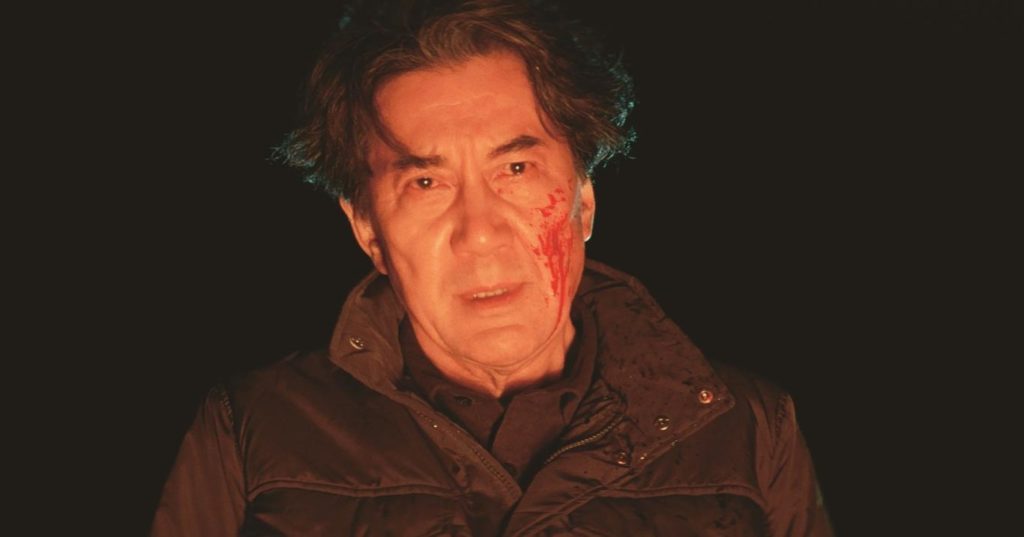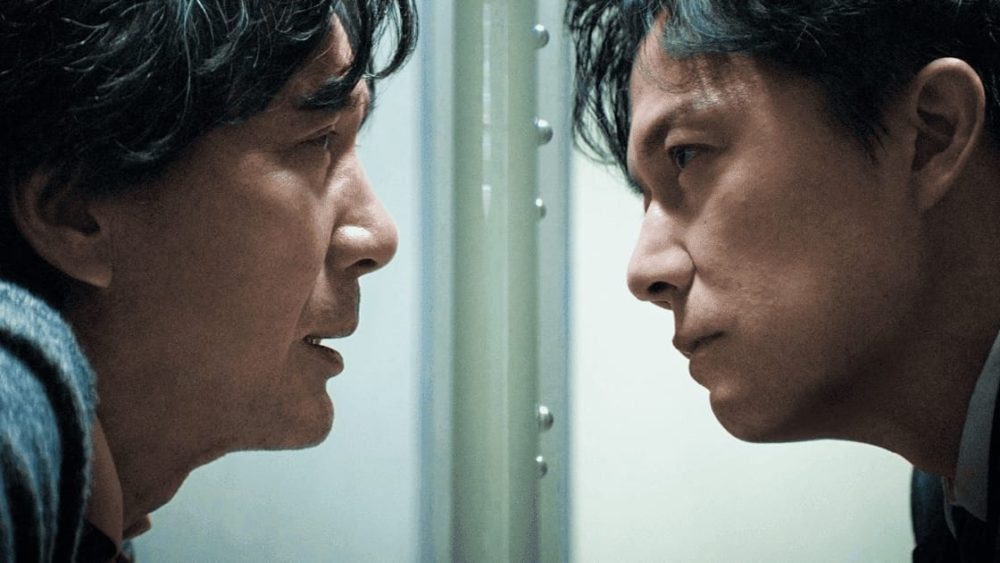
Japanese director Hirokazu Kore-eda’s latest opens on a chilling murder bathed in dark shadows, punctuated by spurts of blood and the orange din of flames. A change of pace, certainly, for a director most often compared to Yasujirō Ozu — but with The Third Murder, Kore-eda isn’t just out to prove himself as more than Ozu Jr. He’s here to challenge our inherent belief in images and our perceptual limits toward truth and judgement.
The movie shifts in mood and pace after the genre-stylings of the cold open. We move to the continually blue-tinged story of mild-mannered Tomoaki Shigemori (the great Masaharu Fukuyama), a lawyer tasked with defending a man named Misumi (Kōji Yakusho) — the murderer we saw in the beginning. Atypical of this sort of genre work, there is no question of who-did-it; in fact, Misumi has confessed and is in police custody. Shigemori isn’t even so much interested in why Misumi has murdered this man, but rather focuses on how best to mount the case so that his client does not receive the death penalty.
Now, if it all sounds low-key and unexciting for a tale of bloody murder… well, you wouldn’t be wrong. The movie develops at a languid pace, and the elements of its mysteries are not so much shockingly revealed as gently given to help paint a larger picture. There are flourishes here and there– a noir-ish fascination with one character’s limp, for example– but Kore-eda is trying to get at notions usually whisked away by films like this. The central conflict becomes less, “How will Shigemuri solve this case?” and more, “How will Shigemuri resolve the dialectical opposition between truth and uncertainty?”
Thankfully, most of this is portrayed by Kore-eda in understated fashion. As usual with his work, some of the best moments are the small interactions between characters, such as when Shigemori discusses Misumi’s criminal past with his former-judge father. The topic is very serious, but framed, delightfully, against Shigemori’s father cooking noodles in the kitchen and wearing a cute apron.

All of this is buttressed through Mikiya Takimoto’s perfectly executed cinematography, a nice combination of bird’s eye views, so-slow-you-don’t-notice pans, and medium-close-ups, and a wistful and melancholy score from Italian pianist Ludovico Einaudi. Yet most impressive are the two central performances. Fukuyama traveled a similar dramatic path in Kore-eda’s Like Father, Like Son,but reveals even more complex depths here. And Yakusho gives one of the best performances I’ve seen in some time. A delicate mix of understated beauty, frustration, and mischievous coyness. He manages to make Misumi both a cypher and relatable.
Greatest of all the movie’s varied pleasures, however, are the slow building scenes between lawyer and client that help paint Shigemori’s descent into confusion. Separated between a pane of glass and shot in long takes, these interrogative moments at first recall Wim Wenders’ Paris, Texas in the way the reflections force a more intimate and shared space. But later, as Shigemori’s conceptions of the case and his role in society are sent into flux, the reflections become more and more intimate, calling to mind Bergman’s Persona — identities crossing, intermingling, but here given a push-pull dynamic, never allowed to fully sublimate.
Reality, it seems, is more malleable than assumed.
Kore-eda seems to be intuiting that in the future, our rigid perceptions will be our downfall. That in a world where reality can be doctored, truth will forever be out of our grasp. Shigemori assembles clues, symbols, character testimonies, and personal histories, but none of it brings him closer — it only tears him further away. The movie opens with the brutal murder; later we see the scene again, but this time details outside the frame are revealed, complicating the narrative. By the end, the entire scene is called into question.
Why were we so foolish to trust an image? Who are we to cast judgement? Shigemori wonders as much as he holds his hand up the light and stares in fear at his own power to define the course of events.
Are you just a vessel? Shigemori asks Misumi near the film’s end
“What is a vessel?” Misumi cryptically responds.
Kore-eda leaves us much like Shigemori, on the brink of uncertainty, unsatisfied and filled with doubt.
The Third Murder
2017
dir. Hirokazu Kore-eda
124 mins
Playing at The Brattle through until Wednesday, August 15.

